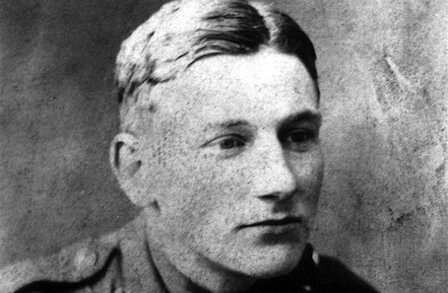Continuing
on with last year’s poetry read, Max Egremont’s Some Desperate Glory: The First World War the Poets Knew, I came
upon this wonderful poem by Edmund Blunden.
I wrote about Egremont’s book last May while posting a on an Isaac Rosenberg
poem. I had never heard of Blunden, but apparently a poet of some renown both during
and after the war. He was a friend to
the more well know Siegfried Sassoon.
Blunden
entered the front in 1916 shortly before a planned spring offensive. Egremont describes Blunden’s arrival.
The western front was now
full of rumours about the coming offensive.
Constant activity was thought to be vital and officers led parties to
reconstruct damaged trenches, repair wire and bury the dead. This was what Edmund Blunden found when he
arrived in France in May.
Blunden was already a
poet of immense fluency. One long
pre-trench poem, finished in March, was a disquieting account of cruelty’s
consequences called “The Silver Bird of Herndyke Mill.” A dark atmosphere threatens an English churchyard,
stream and wood in the kind of Georgian scene that always inspired
Blunden. Early in 1916, with artillery
rumbling from across the Channel, death must have seemed near, even in tranquil
Kentish fields.
After some training in
the camp at Etaples—where a sergeant major was killed by a faulty grenade—Blunden
joined his battalion of the Royal Sussex regiment at La Touret, not far from
Béthune. It could seem idyllic until
heavy guns and mines exploded, let off by both sides. Festubert was within reach, where Sassoon and
[Robert] Graves had been at the end of 1915, and Blunden looked for the local
orchards, finding a chapel dedicated to the Virgin Mary, a peaceful place away
from the guns. Like Sassoon, he went off
on a course; then saw the La Bassée canal, a Red Cross barge on it, the rich
summer landscape and the now ruined village of Cuinchy, near the treacherous
brickstacks. He was close to Neuve
Chapelle by the end of June. (pp 113-4)
That
chapel in Festubert became the subject to this poem. Some more background before you get to the
poem. Festubert is a little town in northern France and was
the focal point of The Battle of Festubert in 1915, the year before Blunden stumbled on the chapel. The town was destroyed but the chapel,
despite taking on projectile fragments, survived, and Blunden apparently taking
a diversion looking for apple orchards stumbled upon it and found it would make
a fine subject for a poem. And so now
you are ready to read the poem.
The
Festubert Shrine
by Edmund Blunden
A sycamore on either side
In whose lovely leafage
cried
Hushingly the little
winds —
Thus was Mary’s shrine
descried.
“Sixteen Hundred and
Twenty-Four”
Legended above the door,
“Pray, sweet gracious
Lady, pray
For our souls,” — and
nothing more.
Builded of rude gray
stones and these
Scarred and marred from
base to frieze
With the shrapnel’s
pounces — ah,
Fair she braved War’s
gaunt disease:
Fair she pondered on the
strange
Embitterments of latter
change,
Looking fair towards
Festubert,
Cloven roof and tortured
grange.
Work of carving too there
was,
(Once had been her
reredos),
In this cool and peaceful
cell
That the hoarse guns
blared across.
Twisted oaken pillars
graced
With oaken amaranths
interlaced
In oaken garlandry, had
borne
Her holy niche — and now
laid waste.
Mary, pray for us? O
pray!
In thy dwelling by this
way
What poor folks have
knelt to thee!
We are no less poor than
they.
I
doubt Blunden was Catholic—perhaps he was high Anglican—or if he was even religious,
but the appeal to the Blessed Mother is moving: “Pray, sweet gracious Lady,
pray/For our souls.” I particularly like
the image of the stone front scarred with shrapnel. He refers to it as “War’s gaunt disease,” as
if it were the remnants of a pox. The
final image of poor folks kneeling, and he and his fellow soldiers being just
as poor reduces the gallantry of war to resignation.
I’m
going to count this as a Faith Filled Friday post in addition to a poetry. Blessed Mother pray for the war dead.


This is a wonderful poem, Manny.
ReplyDeleteWe studied Wilfred Owen at school.
http://www.warpoetry.co.uk/owen1.html
God bless.
Hopefully I'll post a poem by Owen by the time I finish the book. Thanks Victor.
Delete